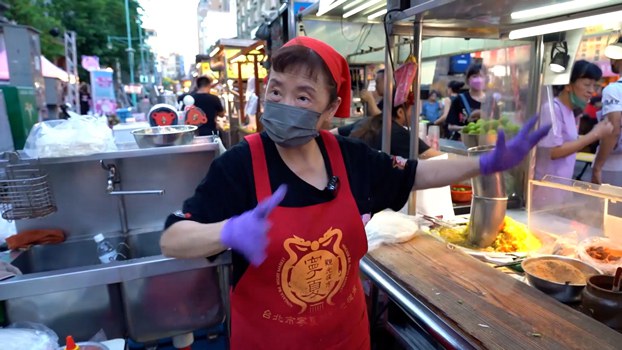Every evening, shortly after the kids get out of school, vendors start pushing their carts laden with raw ingredients, cooking apparatus, oil and other paraphernalia to the Ningxia Night Market at the intersection of Ningxia and Chongqing streets in Taipei.
Many of the dishes on offer – crispy squid, oyster omelet, braised pork and papaya milkshakes – are quintessentially Taiwanese street foods whose recipes have been handed down through families for several generations.


“I didn’t want to take it over at first,” stallholder Lin Chiu-yun said of the 70-year-old savory pancake business that was handed down by her father. “It turns day into night, and other people can go away on vacation on public holidays, but we can’t.”
“Then my father suddenly got sick, and I started running into regular customers around the night market, because we live nearby,” she said. “They were asking me when I was going to come out and start running things.”
“So I bit the bullet,” she said, adding that the stall could even get handed down to her daughter Minhsuan, who currently helps out.
Around 60% of the market’s custom comes from local residents, with the rest from overseas tourists, including plenty of visitors from Hong Kong.


It’s big business, as well as a generations-old purveyor of the island’s street culture, according to its democratically elected president.
Market association president Lin Ting-kuo told RFA Cantonese that the market’s popularity among local people is a key reason for its healthy rebound after the lifting of COVID-19 restrictions.
“When something happens internationally, or there’s a pandemic, it’s the local tourists who help you to survive,” he said.
A top tourist attraction
A recent survey by Taiwan’s Tourism Bureau found that the island’s night markets have long been the top attraction for tourists, with 80% of inbound tourists visiting a night market during their trip before 2019.
A Spanish tourist who gave only the name Gertruda said she was enjoying herself on a recent trip to Ningxia Night Market.
“You can get delicious food, and great drinks, so it’s a great place,” she said.


But the locals love them too. And the Ningxia Night Market has been a fixture of the city’s Datong district since the now-democratic island was under Japanese colonial rule in the first half of the 20th century.
“It’s pretty good value for money and there are very diverse foods,” said a Taiwanese customer at Ningxia in a recent interview.
Lin Ting-kuo puts that down to the fact that vendors are constantly experimenting with new recipes, to cater to changing tastes.
“There are a lot of innovative products there alongside the traditional ones,” he said. “For example, one nightclub has a stall set up in the night market to offer [cocktails].”
“The owner of this stall is very old, and is a third generation stallholder, who used to sell braised pork with rice,” he said.


There are also online discount coupons, mobile phone payments and games to promote the market, in addition to the online banquet-booking service, he said.
One of the most popular options is the Chitose Banquet, which offers a taster selection of vendor snacks and offerings all in one place.
There is clearly a huge amount of political investment in making it work, at the local level, according to the YesAsia tourism website.
“In addition to mouth-watering snacks and delicacies, the night market also has a strong human touch, and many local stories and cultural spirits are included,” reads the Ningxia Night Market listing.
Promoting ‘neighborhood harmony’
True to the country’s democratic way of life, vendors elect their own president to represent them, and a finance committee keeps the books in order, as well as making the market’s dealings transparent.
The market association also works with local government officials “to promote neighborhood harmony,” the listing says.
“When the night market is closely integrated with the emotions of local culture, the image and taste of each stall become fun and interesting cultural stories that are constantly being told,” it says.


The Ningxia Night Market started out as a ring of shabby vendor stalls in the middle of an intersection, which the displaced Kuomintang-ruled Republic of China government started regulating in around 1954.
By 1973, the Taipei city government had relocated the vendors’ stalls to their current location, where the Ningxia Night Market began to flourish.
By 2000, it had transitioned into an environmentally friendly operation.
“The Ningxia Night Market once failed to do a good job of protecting the environment, which was unacceptable to the residents of the community,” Lin Ting-kuo said. “We came up with a … renovation project in which we banned disposable tableware to reduce garbage.”
“The next stage was even more drastic – we banned melamine tableware,” he said. “Then, we filtered waste oil and gray water from the stalls before discharging clean water into the city’s sewer system.”
“We hire a professional grease removal company every week, too,” Lin said.


Diners can book “banquets” online to sample a large array of the different dishes and snacks offered by vendors at a single table, including a “Thousand Years Banquet”, “State Banquet at the Presidential Palace,” while environmentally friendly and calorie-labeled banquets are also on offer, the site said.
There are several common seating and stand-and-eat areas, with power and water supplied to vendors, leaving the site clean and filled with the aromas of cooking, rather than less desirable smells.
“In the past, we had to get a big tub of water and push it over here in a cart,” Lin Chiu-yun said. “That was an inconvenient way to wash [the dishes].”
“Nowadays, it’s super-convenient – you just turn on the water.”
Translated by Luisetta Mudie.
